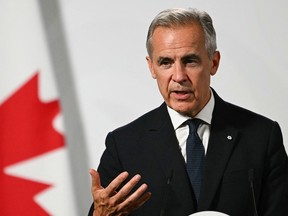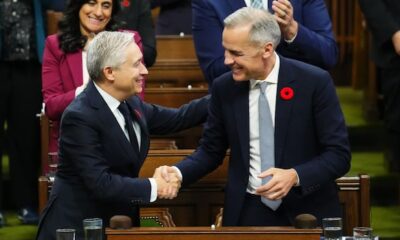World
Mark Carney Faces Criticism Over Canada’s Soaring Debt Levels

The Canadian government is grappling with a significant fiscal challenge as Prime Minister Mark Carney reveals plans to borrow approximately $80 billion in 2025. This move comes amid escalating concerns regarding the nation’s growing debt, which has raised alarm among fiscal watchdogs and citizens alike. The burden of interest payments alone is expected to exceed $1 billion each week, diverting funds that could otherwise be used for essential public services like healthcare.
In a recent statement, the parliamentary budget officer (PBO) issued a stark warning about the country’s financial trajectory, describing the situation as “unsustainable.” The PBO emphasized that the current path could lead to severe economic consequences, urging the government to take immediate action. This warning highlights the troubling reality that the government is now spending more on interest payments than it allocates to provinces for healthcare transfers.
Government Spending and Future Projections
The fiscal situation under Carney’s leadership appears to be a continuation of previous administrations. The government is projected to increase its spending to $581 billion this year, which is $38 billion more than last year. Looking ahead, spending is expected to escalate to $644 billion by 2029. Critics argue that these figures contradict the government’s claims of finding savings and suggest a troubling trend of rising expenditures rather than fiscal restraint.
Despite this, Carney has promised to balance the operating budget while still allowing for substantial borrowing. According to his estimates, the deficit is expected to be $57 billion in 2029. Critics point out that this hardly equates to a balanced budget when the overall debt continues to rise.
In a notable shift, Carney has altered the previous fiscal framework from focusing on reducing the debt-to-GDP ratio to a deficit-to-GDP ratio. This change has drawn scrutiny, as it may obscure the reality that the debt is projected to grow faster than Canada’s economy. By 2030, the government plans to increase the national debt by $324 billion, a stark contrast to former Prime Minister Justin Trudeau‘s plan to add $154 billion during a similar timeframe.
Public Reaction and Future Implications
The Canadian Taxpayers Federation has expressed deep concern over the government’s financial strategies. They argue that instead of tackling the debt crisis head-on, Carney is opting for misleading rhetoric that fails to address the real issues at hand. Critics warn that without significant cuts to spending, the government risks jeopardizing the financial future of Canadians.
As interest payments continue to rise, projections indicate that by 2029, approximately 13 cents of every dollar collected by the government will be used to service the debt. This alarming statistic underscores the urgency for the government to rethink its financial priorities.
While Carney attempts to present a reassuring narrative about the economy, the reality is that Canadians are increasingly concerned about the implications of ongoing debt accumulation. The pressing need for effective fiscal management and accountability cannot be overstated. As the government continues to navigate these challenges, observers are calling for immediate, substantive action rather than mere reassurances that everything is under control.
In conclusion, the current trajectory of Canada’s fiscal policy raises serious questions about sustainability and accountability. Without decisive measures to curtail spending and address the growing debt, the government may find itself facing a more severe economic reckoning in the years to come.
-

 World4 months ago
World4 months agoScientists Unearth Ancient Antarctic Ice to Unlock Climate Secrets
-

 Politics3 days ago
Politics3 days agoSecwepemc First Nation Seeks Aboriginal Title Over Kamloops Area
-

 Entertainment4 months ago
Entertainment4 months agoTrump and McCormick to Announce $70 Billion Energy Investments
-

 Lifestyle4 months ago
Lifestyle4 months agoTransLink Launches Food Truck Program to Boost Revenue in Vancouver
-

 Science4 months ago
Science4 months agoFour Astronauts Return to Earth After International Space Station Mission
-

 Technology2 months ago
Technology2 months agoApple Notes Enhances Functionality with Markdown Support in macOS 26
-

 Top Stories4 weeks ago
Top Stories4 weeks agoUrgent Update: Fatal Crash on Highway 99 Claims Life of Pitt Meadows Man
-

 Sports4 months ago
Sports4 months agoSearch Underway for Missing Hunter Amid Hokkaido Bear Emergency
-

 Politics3 months ago
Politics3 months agoUkrainian Tennis Star Elina Svitolina Faces Death Threats Online
-

 Politics4 months ago
Politics4 months agoCarney Engages First Nations Leaders at Development Law Summit
-

 Technology4 months ago
Technology4 months agoFrosthaven Launches Early Access on July 31, 2025
-

 Top Stories2 weeks ago
Top Stories2 weeks agoFamily Remembers Beverley Rowbotham 25 Years After Murder




















